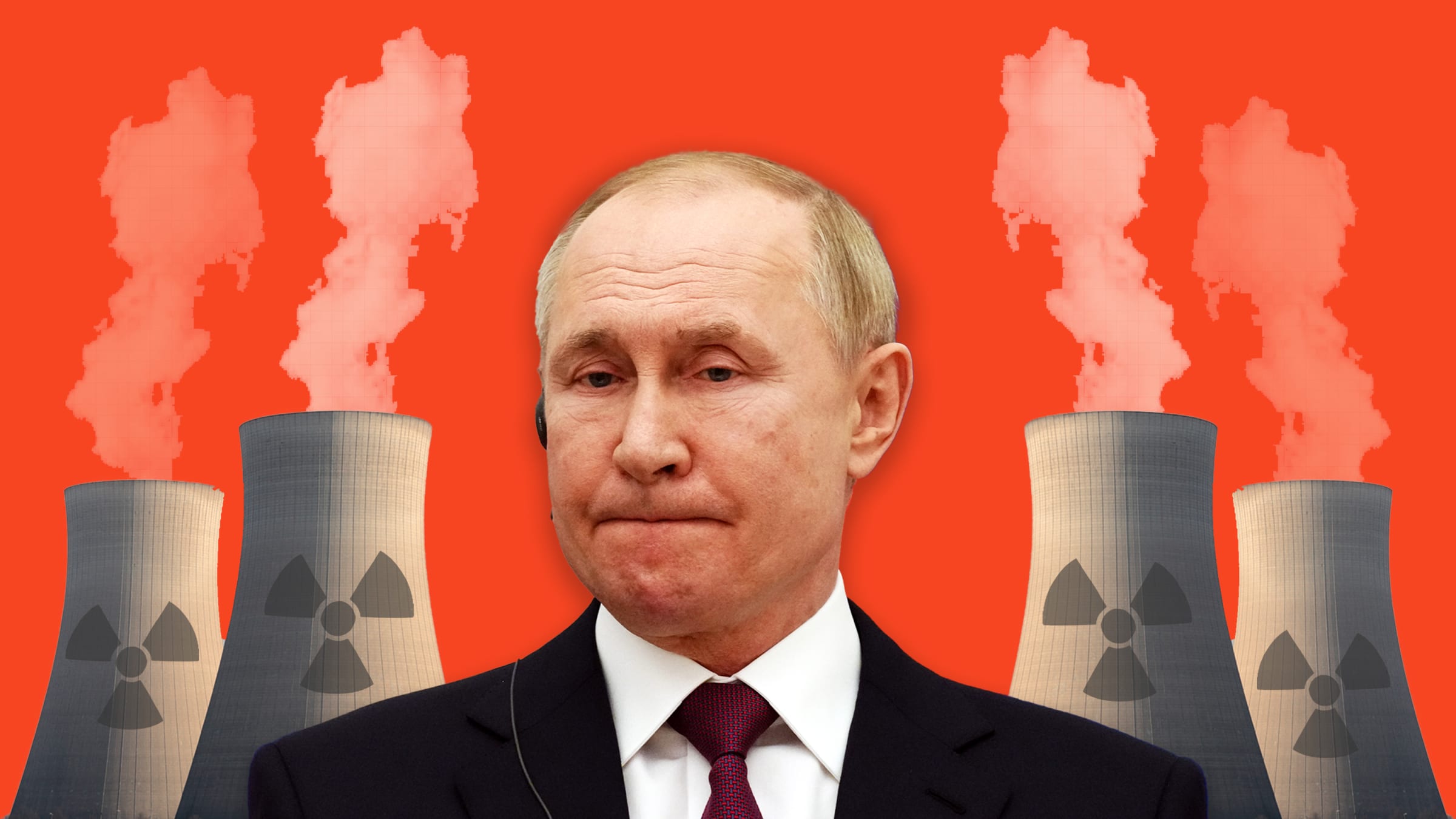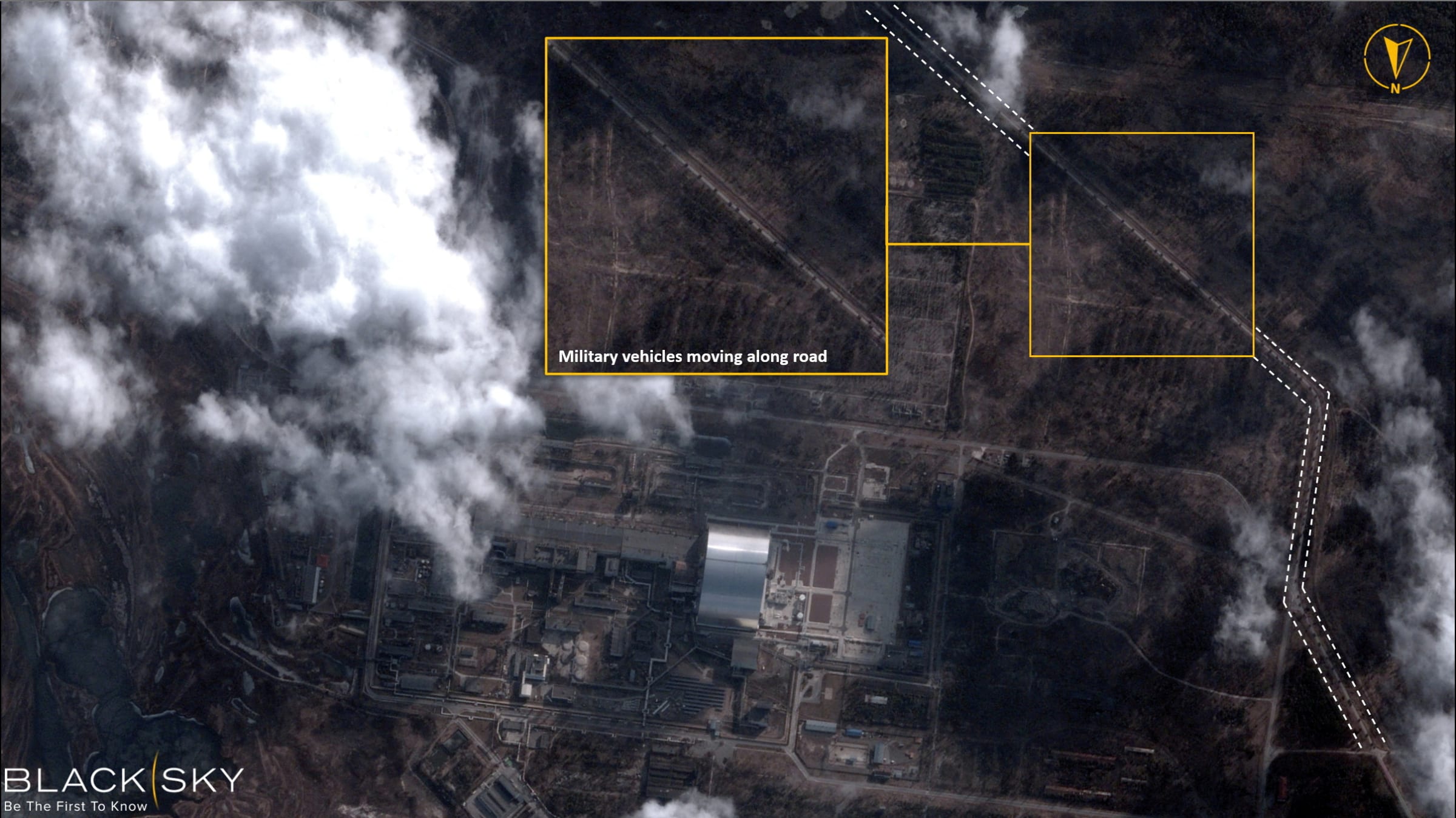The takeover of Ukraine’s nuclear facilities is a vital part of the Kremlin’s “fear and control” strategy in the war.

Photo Illustration by Kristen Hazzard/The Daily Beast/Getty
Jeremy Kryt
Published Mar. 13, 2022 8:47PM ET
The world watched in horror as shelling by Russian forces set fire to part of the Zaporizhzhya nuclear plant in southeastern Ukraine. Immediate catastrophe was averted when the flames were put out, but the plant—which is home to six separate reactors—was captured by the Kremlin’s forces on March 4.
Russia has also taken control of the nuclear facility at Chernobyl, which although inactive, still houses deadly radioactive materials. The situation at Chernobyl took a dramatic turn for the worse on March 9 when the power supply was cut off and the electricity-dependent cooling system for spent nuclear rods was endangered. A partial outage at Zaporizhzhya followed a day later.
Ukraine is home to three additional nuclear facilities totaling nine more reactors, and some observers have theorized those are also likely to be targeted as Russia seeks to gain control over the nation’s power supply.
“The Russians will want to secure the other three Ukrainian nuclear facilities as part of this strategy,” Dr. Robert J. Bunker, research director at the security consultancy ℅ Futures LLC, told The Daily Beast. Bunker hypothesized that an “airborne assault could be utilized as an early component of a ground force offensive drive” to seize one or more of the remaining plants. If or when Russian forces are able to regain the offensive, “the three reactors at the South Ukraine facility would be the next logical target in this regard.”

A satellite image shows military vehicles alongside Chernobyl nuclear power plant on Feb. 25, 2022.
BlackSky via Reuters
So what’s behind the Russians’ obsession with Ukraine's nuclear plants?
Let’s start with Russia’s own stated reason for going after the plants, which is that Kyiv had been using material at the sites to build a thermononuclear bomb.Those charges escalated on March 9, when Foreign Ministry spokesperson Maria Zakharaova told Russian media that Ukraine intended to use its alleged nuclear arsenal against Russia.
The Foreign Ministry Twitter account recorded Zakharova as saying that Russia had occupied Chernobyl and Zaporizhzhya “exclusively to prevent any attempts to stage nuclear provocations, which is a risk that obviously exists.”
U.S. experts interviewed by The Daily Beast pushed back hard on those claims.
“That was a baseless invention by Moscow to justify its invasion and seizures of nuclear power plants,” said retired military intelligence officer Hal Kempfer.
Kempfer, who formerly directed a coalition task force that studied weapons of mass destruction [WMDs], accused Russian president Vladimir Putin of “creating information or ‘facts’ to fit an official narrative, no matter how fake, illogical, ridiculous, unsubstantiated or easily refuted they may be,” said Kempfer, who called the claim that Ukraine had intended to use WMDs “truly Orwellian.”
Fear is a very powerful weapon in warfare.
Bunker, a former professor at the U.S. Army War College, agreed.
“I think the Russian narrative is meant to obscure Putin's strategic objectives as well as use propaganda to make the Ukrainian defenders appear as aggressors and war criminals that must be stopped,” he said. “Also, if a radiological release or nuclear event took place the Russians might try to label it as part of a false flag Ukrainian or even NATO backed plot.”
There might not be a WMD plot afoot, but that doesn’t mean the reactors aren’t valuable targets, in particular because about 50 percent of Ukraine’s electricity is generated by nuclear power.
“There is strategic operation value in controlling energy and communication centers and choke points,” said retired Marine Colonel G.I. Wilson, whose writings originated the popular concept of Fourth Generation Warfare. “That aspect has considerable merit [for the Russians].”
According to Kempfer, part of that merit comes from the fact that such control over the electrical grid would allow the Kremlin to turn the lights off at will over vast swaths of Ukraine.
“Turning off the power nationwide—as [Russian force] have done on a smaller scale in Mariupol—in the middle of winter creates mass hardship and suffering for the Ukrainian population, and that is apparently a weapon Putin feels free to utilize,” Kempfer said.
Such a move could also have a chilling effect on the nation’s commerce.
“The industry and economy of Ukraine can’t function if 50 percent of its power generation capabilities are either controlled by Russian forces or disabled,” said Futures’ research director Bunker, who also pointed out that the reactors could serve as immense “bargaining chips” in any future ceasefire or peace negotiations.
The reactors are also positioned near major railheads that transport nuclear fuel. Those same shipping hubs could be easily repurposed by the Russians for moving armored vehicles and munitions to battlefields around Ukraine, especially since their tanks have been running short on gas.
The targeting of nuclear facilities—including the wanton shelling that set part of Zaporizhzhya ablaze and the ongoing power outages at the plants—also sends a deliberate message that this is a kind of no-holds-barred warfare in which even the risk of nuclear devastation can’t be ruled out.
“It’s a psychological weapon being used to terrorize the population,” said intelligence officer Kempfer. “They’re [targeting nuclear plants] as a way to put tremendous pressure on the Ukrainian government to capitulate. That’s their endgame.”
Kempfer also said the takeovers were a way to warn the U.S. and NATO and against their potential involvement in the conflict.
“[The Kremlin] is able to raise the specter of radioactive calamity without ever introducing nuclear weapons. Putin is a calculating guy and he realizes that we get very concerned any time a nuclear plant is threatened. The world saw Chernobyl, the world saw Fukushima, and we don’t want to see that again.”
Kempfer likened the tactic of going after Ukraine’s nuclear plants to that of Rome sewing salt into Cartheginian soil at the end of the Punic Wars, so that nothing would ever grow there. “They’re saying [...] we might irradiate a big chunk of Ukraine so it’s dead earth and you can never use it again. That’s the implied threat. That they can turn all of Ukraine into one big Chernobyl.”
Ukraine: Putin Plotting False-Flag Chernobyl Terror Attack

Taking risks that could lead to a catastrophic accident might be intended to show Russia’s disregard for the consequences of radioactive fallout, but Bunker said there could also be an even darker, more deliberate motive for going after reactors.
“If the Putin regime wants to play ‘authoritarian hardball’ it can threaten to release radiological material into the atmosphere from the Zaporizhzhia facility under its control,” Bunker said. Such a move could be used to force Kyiv to accept Russian rule or “as a deterrence measure to inhibit Ukrainian forces from retaking the facility.”
Marine Colonel Wilson called such behavior “Russian brinkmanship” designed “to give the impression of upping the ante in a very high-stakes encounter” in which “everything is targetable and nothing is safe.”
“Fear,” Wilson said, “is a very powerful weapon in warfare.”








